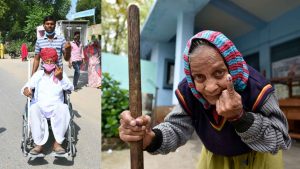Techies From IIT & IIM Offer Free Classes to 12000 Students, Empower 79 Startups
Inspired by the vision of Dr. APJ Abdul Kalam, alumni from NITs, IITs and IIMs have joined hand to form Hyderabad-based iB Hubs and offer free education on 4.0 technology to 1 crore students across India.
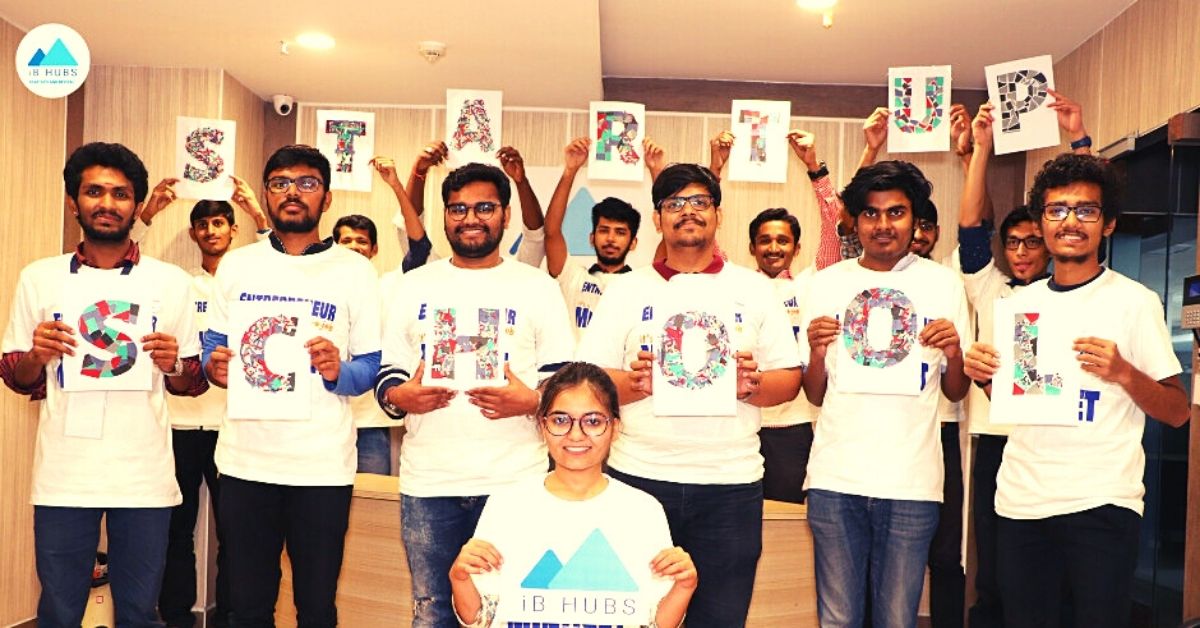
Since its launch in November 2016, iB Hubs, a Hyderabad-based organisation consisting of alumni from top institutions like IIT, IIM, IITs and NITs, has been working tirelessly towards making India a global leader in 4.0 technology, which is driving the fourth stage of the global industrial revolution.
This stage emphasises the ongoing automation of traditional manufacturing and industrial practices using modern smart technology, including the Internet of Things (IoT), Industrial Internet of Things (IIoT) and Cyber-Physical Systems (CPS), Artificial Intelligence (AI) and Cognitive Computing, amongst others.
“The core team consists of 35-odd members, a majority of whom are alumni from top IITs, NITs and IIITs. A few of us had even quit top-paying jobs in companies like Amazon, Microsoft, Intel and Qualcomm to start this endeavour. Since high school, most of us have known each other, and the rest include those who have bought into our vision. The common binding force between us is to see India as a global industry leader in 4.0 technology,” says Kavya Dommeti, the iB Hubs CEO, speaking to The Better India.
If we look at past industrial revolutions, it’s the West that has driven innovation. Kavya notes that India has so much untapped potential to become a global leader in the next phase of the industrial revolution. That belief, she argues, led to the establishment of iB Hubs, where they primarily focus on driving innovation in 4.0 technology and fostering a culture of entrepreneurship among young Indians through different initiatives.
“Our work is centred on 4.0 technology and entrepreneurship since it’s the latter that drives innovation in the former. From 35 members, we have over 500 today,” she adds. To further their initiatives, iB Hubs works with for-profit ventures, non-profits, state governments, colleges, schools and startups across India. Among the plethora of initiatives, there are three standouts – iB Hubs Startup School, iB Hubs Power to India and ‘India 4.0 – Dr APJ’.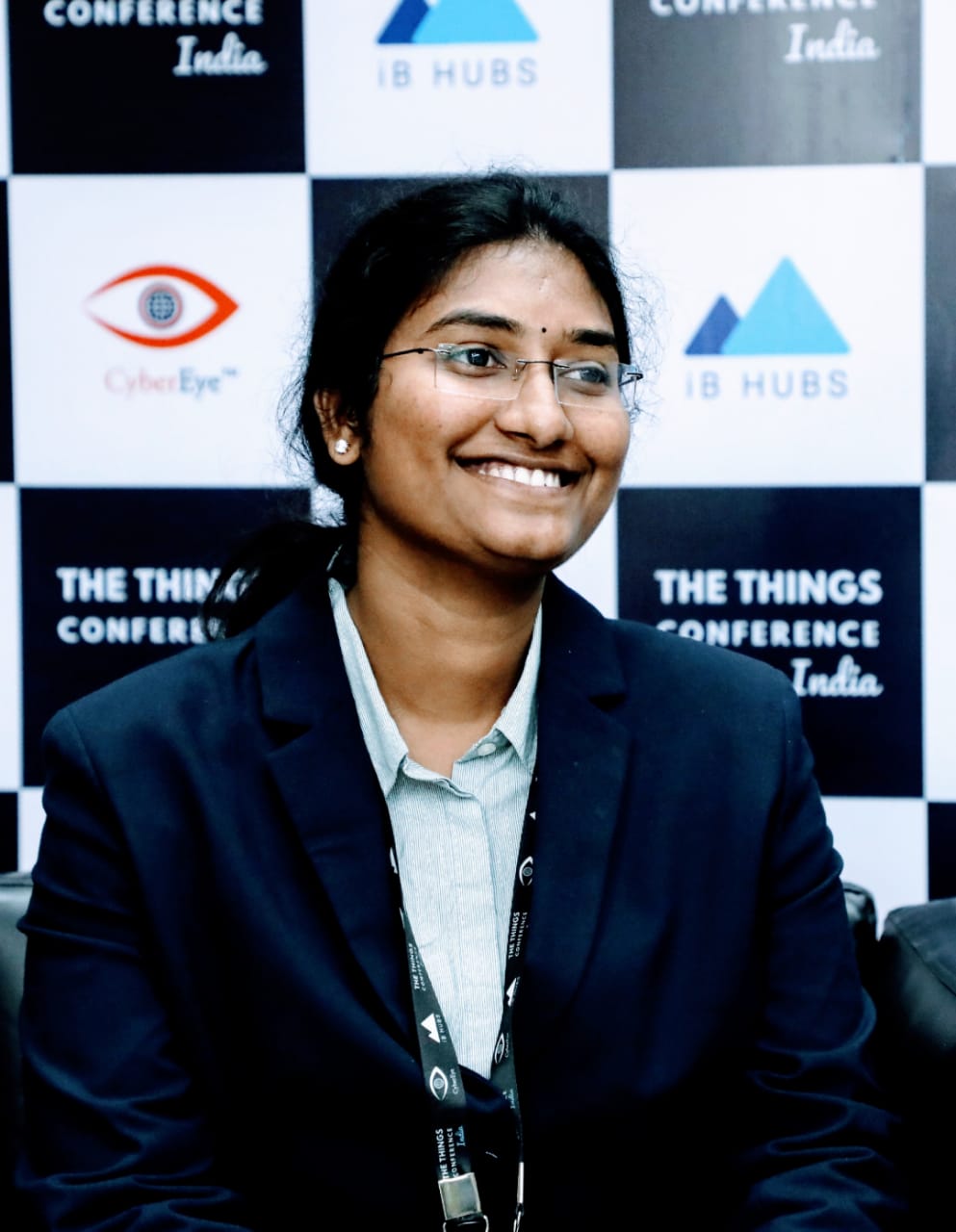
iB Hubs Startup School
This is a zero-fee, zero-equity, 4-week acceleration program specially designed for students to help them shape their ideas into reality and accelerate their startups’ growth. The all-inclusive program was initiated in 2017 to boost college startup ecosystems across India.
“The Startup School was among the first initiatives we started. Our objective here is to create an ecosystem that would facilitate innovation and entrepreneurship across different parts of India. In this regard, we sought to establish an institution that would attract the best student entrepreneurs from around the country who could become role models for future generations. That thought process led to the creation of a startup school,” says Kavya.
Any student entrepreneur can apply to this four-week residential programme organised twice a year—one in Hyderabad and another in Lucknow. After they apply, these student entrepreneurs go through a rigorous evaluation programme before they’re taken in. Although last year’s edition got called off because of COVID, this year, iB Hubs will be hosting a virtual Startup School and planning for the same will begin at the end of this month.
“At the end of our 28-day startup school, student entrepreneurs obtain real clarity about how their product works for customers, what’s the potential of taking their business idea forward and commercial viability. We have seen two kinds of outcomes for our students. Some take their ideas forward, establish a startup around it, develop a minimal viable product (MVP), do a lot of prototyping, innovate and accelerate it forward. Meanwhile, others realise how their product idea may not be worth taking forward. Using that as motivation, they come up with new ideas and maybe end up working in a salaried job for a short while before venturing into entrepreneurship once again with greater clarity,” notes Kavya.
In the past three editions, iB Hubs has supported 79 startups and 130 student entrepreneurs. These startups are powerfully going ahead with 70+ B2B (Business to Business) clients, 25+ accelerations, grants, fundings, and securing top spots in various competitions. Some have even gone back to their colleges, creating their own entrepreneurship cells for their juniors.
As a result, they have received more applications from the same institute and those within its vicinity. Last year, they received applications from 27 states, including the Northeast.
“We receive a minimum of 800-900 applications for our Startup School programme. In 2018, for example, we supported 10 startups in our Hyderabad batch and another 10 in the Lucknow batch. We screen applicants for commitment to their ideas, entrepreneurial mindset, USP of their idea, and their work before. We don’t use traditional methods to screen student entrepreneurs by giving them marks on a test. Our objective is to understand their entrepreneurial DNA and whether they have what it takes. Our objective is to give their ideas the best support moving forward,” notes Kavya.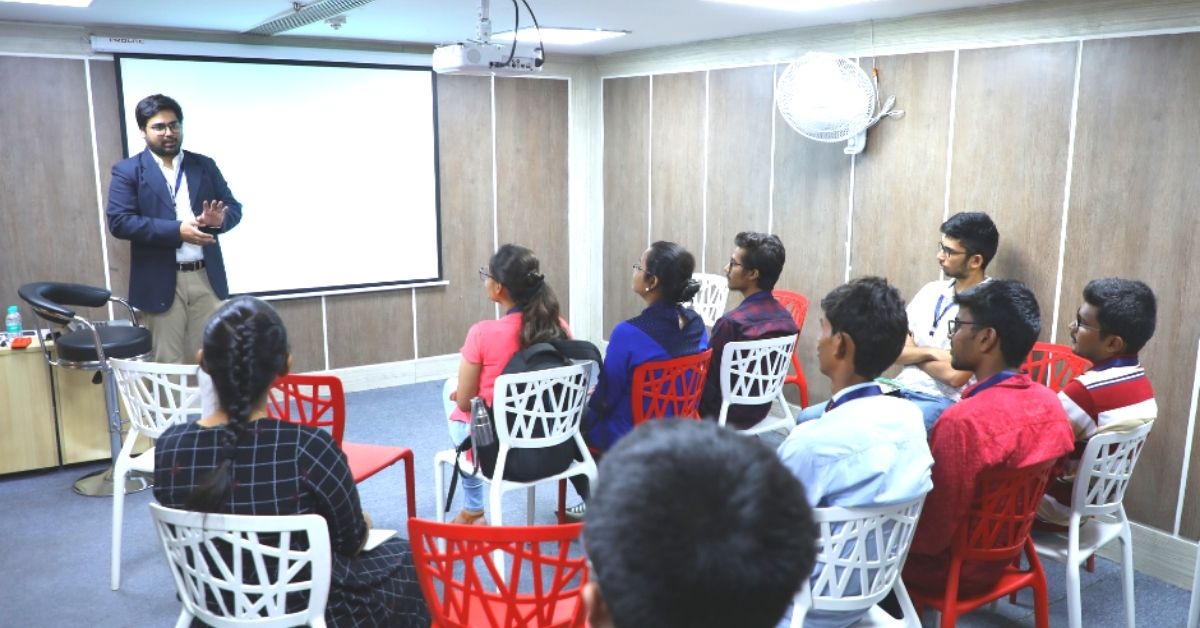
What’s particularly heartening about the Startup School is selecting student entrepreneurs from elite institutions, major metropolitan cities, lower-ranking colleges, and Tier-2 or Tier-3 cities and towns.
Take the example of Nivedha RM, the founder of Bengaluru-based startup TrashCon, which offers a one-stop solution for waste management. Their standout product, Trashbot, is a semi-automatic waste segregator that segregates waste within minutes. Attending the iB Hubs Startup School in 2017, this product of RV College of Engineering today has clients ranging from the Adani Group to the Bruhat Bengaluru Mahanagara Palike (BBMP).
Shubham Soni, the co-founder of Namaste Gaon, a Udaipur-based digital media platform that provides users with local news and happenings around municipal towns, is another product of the iB Hubs Startup School. He was in his second year of engineering at Amity University, Jaipur, in 2017, when he attended the Lucknow edition of Startup School.
“We applied with our then startup called Notes Bundle, which uploaded class notes taken by college toppers and professors onto one platform. Attending the Startup School’s Lucknow session changed my life because, before that, no one in college taught us how to start an enterprise, how to raise money for it and monetise our product idea. At Startup School, they taught us everything from scratch. They taught us how to think about an idea, raise funds, expand, validate products with our first customers, understand your go-to-market, market your product and what public relations strategy you can employ, etc. Before attending the Startup School, we knew nothing about these facets,” says Shubham.
Those chosen for the Startup School work on their own startups and ideas. Some of the business concepts taught are the same, but mentors from the industry’s biggest players teach students how to apply them to their specific ideas or startups. “What’s more, all of this was free of cost with no equity charge. They completely changed our mindset towards entrepreneurship because we had such good mentors talking to us,” adds Shubham.
They operated Notes Bundle for a couple of months before handing the operations over to their juniors in Amity University. Instead, Shubham and co-founder Pulkit Khatri pursued another startup idea, which they operate today called Namaste Gaon.
“Pulkit Khatri and I are from small towns in Rajasthan. As residents of small towns heavily dependent on newspapers for their daily news, we understood the demand for hyperlocal news about our particular town or village. Today, our hyperlocal Hindi news app covers news in 25 towns across six districts in Rajasthan. We operate in towns with populations ranging from 10,000 to 5 lakhs, where the majority of people heavily depend on local newspapers to read local news. If we had started Namaste Gaon without training from Startup School, it might have taken us a year to formulate an idea, make a product and acquire our first 1,000 users onboard. On the day we launched Namaste Gaon in 2019, we received our first 1,000 users in 24 hours. That’s the difference iB Hubs Startup Schools made,” he says.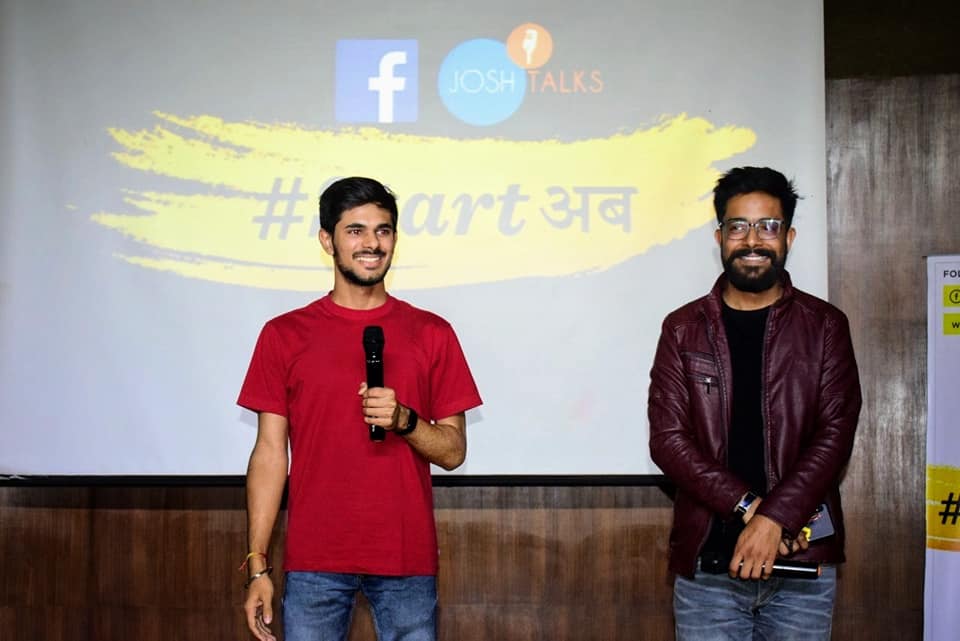
iB Hubs Power to India
“To help our youth realize their true potential and to present them with opportunities in the 4.0 revolution, we initiated iB Hubs Power to India in 2018 and took it across Uttar Pradesh, Andhra Pradesh, and Telangana, including Tier 2, 3 and 4 cities. This programme is a series of workshops covering entrepreneurship and emerging technologies like IoT, cybersecurity, data analytics, which are being organized in partnership with IIT Kharagpur, IIT Kanpur, Dainik Bhaskar and The Indus Entrepreneurs-Hyderabad. Through this initiative, 37 workshops were organised, impacting over 5500 students from 75 colleges,” notes Kavya.
‘India 4.0 – Dr APJ’
The latest initiative that iB Hubs have embarked on is the ambitious 4.0 education for 1 crore children from financially challenged families. Inspired by former President Dr APJ Abdul Kalam’s vision, they offer free education on 4.0 technology to 1 crore students across India. Students from the 5th-10th standard are inducted into this program.
“They will be taken care of until they reach 21 years of age. In Phase-1, the project will be available in 650 districts across India. A specific number of children from each district will be given free 4.0 education. Classes for the first batch commenced on 15 October 2020 with about 12,000 students from 24 states. Apart from bringing prosperity into lakhs of families, these children would become role models in their community, inspiring more people to study and igniting a spark for a greater transformation,” states Kavya.
In a recent press release, they state, “Under this project, the economically backward children will have access to online programs like xPM 4.0 (Exponential Performance Mindset) which accelerates personal and professional growth required for the 21st Century, and CCBP 4.0 (Continuous Capacity Building Program) to build industry-ready skills. They will be trained by industry experts and alumni of Stanford, IITs, IIMs, etc.”
This philanthropic venture is seeing collaboration between various State governments, government schools, for-profit entities like CyberEye Research Labs, a Gurugram-based venture working on cutting smart technologies in cybersecurity, NxtWave, an entity dedicated to building industry-relevant skills, ProYuga, a Mumbai-based venture developing products in virtual, augmented and mixed reality, and non-profits like the Hyderabad-based Make The World Wonderful. Their primary targets here are government school students.
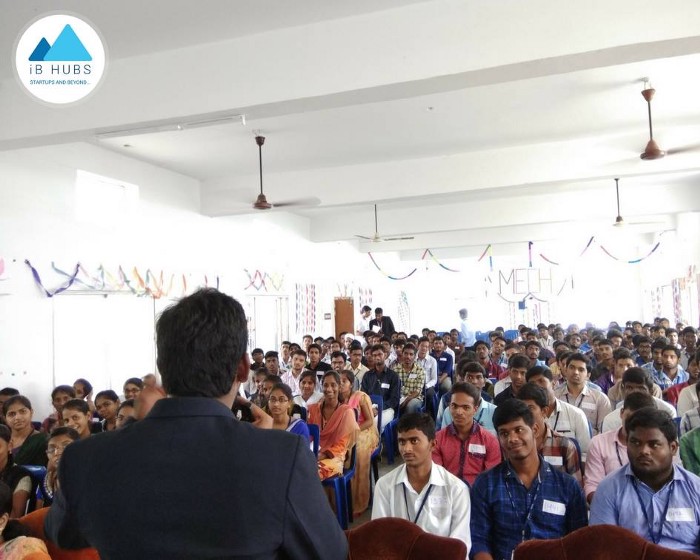
“For Batch 1 students, we have started with an introductory course on everything from 1.0 to 4.0 technology, awareness about different advanced technologies like virtual reality, augmented reality, internet of things, space technology, etc. The course is available in three languages–English, Hindi and Telugu. We are working towards translating these courses into other vernacular languages as well. After these introductory courses, we will inculcate basic aptitude skills, a few essential mathematics skills that are not part of their everyday school curriculum, essential English language skills and few modules on personality and mindset development. We have designed a platform that will seek to give utmost personal attention to every student we come across,” says Kavya.
Students have sessions every day from 7-7.30 pm, and the programme is built entirely on the idea of self-based learning. In partnership with NxTWave, they have issued a specially-designed learning portal for their students, and if they miss out on a lesson on any particular day, they can log in and catch up on it. This course is available to them for free till the age of 21, depending on the modules or courses they complete.
A key facet of their course is called the Continuous Capacity Building Program 4.0 (CCBP 4.0), where they have different levels of learning 4.0 technology.
“Traditional academics are designed for multiple objectives, including higher studies, research, etc. It is not particularly focused on making an individual industry-ready. As a result, many are settling for salaries that are at least 2 to 3 times lower than their capability. CCBP 4.0 removes the gap between industry requirements and academic preparation with reverse-engineered curriculum and structured guidance,” notes their website.
By the age of 21, iB Hubs wants the student equipped with technology and personality development skills. They have set targets of harnessing talent for each state and UT. “We have an army of mentors from elite global educational institutions and firms who have voluntarily dedicated their time to develop our course and teach these students,” she says.
Meghana Dabbara, the co-founder of the non-profit Make The World Wonderful, has volunteered to teach some of the introductory courses for these students.
“I have taken about 40-50 sessions since we started with our first batch on 15 October 2020. We have given them historical context to 4.0 technology and how the world is moving around this technology. We are starting with the absolute basics here and will soon start courses around personality and mindset development. We are currently focussing on enhancing their aptitude and developing basic mathematical skills. 3,000 students attend our daily live sessions on average, but everything taught is available on our platform free of cost to all these students across Hindi, English and Telugu,” she says.
People teaching these courses are primarily from the NxtWave and iB Hubs teams, who voluntarily come forward and teach these courses. This course is open to any student who applies from financially challenged families whose annual income doesn’t exceed Rs 1.2 lakhs, and if they have property, its value shouldn’t exceed Rs 5 lakh.
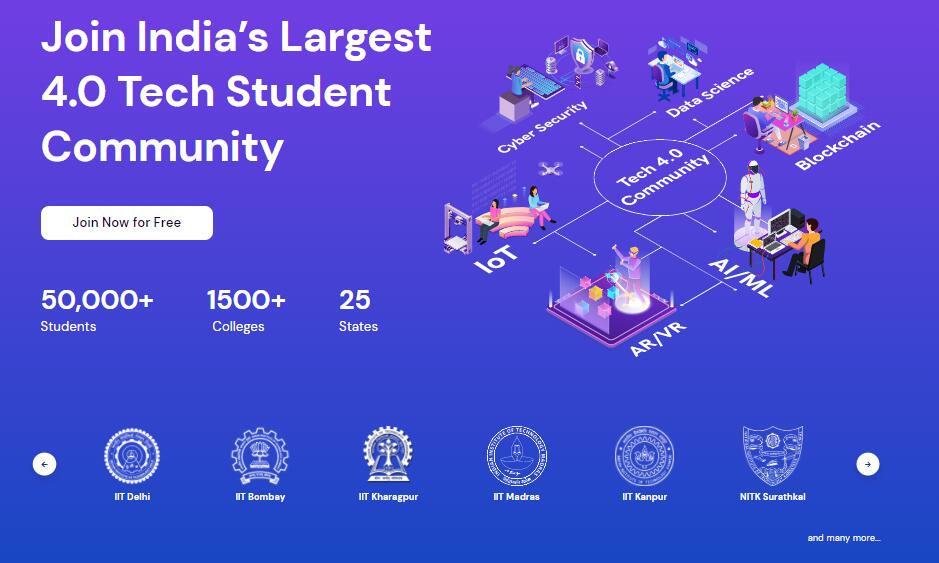
The vision set out by iB Hubs is indeed great, but certain issues require ironing out. One major concern is ironing out the digital divide, particularly the cost of data.
“In the first batch, we found that over 60% of students have access to smartphones. More importantly, neighbours and well-wishers of these registered students are willing to lend their smartphones for these 30-minute sessions. As schools open, government schools with the necessary infrastructure are opening up their facilities to students. We have approached many nonprofits to facilitate learning. The digital divide is a problem, but we recognise the importance of addressing this issue. We are developing a support system on how to combat this problem. For example, the Nagaland government recently put out a notification talking about our programme and asking residents to donate extra smartphones anyone may have to the nearest mandal office for our students,” she says.
In addition, NxtWave, powered by iB Hubs has built India’s largest 4.0 Tech Student Community by bringing together a group of forward-thinking students across India. It’s already 30,000+ strong with students from 500+ colleges across the country. Being a member of this community one can also attend classes by tech minds from Apple, Microsoft, Nvidia, Stanford. Students will be notified of the latest internships, job opportunities, events, competitions, ideations, and more. Visit www.ccbp.in to know more.
Despite the obstacles before them, one must appreciate the vision of pushing this initiative through. It will take some time before all their issues are ironed out, but until then, one can hope this will facilitate India’s push towards securing its place in 4.0 technology globally.
(Edited by Vinayak Hegde)
Like this story? Or have something to share? Write to us: [email protected], or connect with us on Facebook and Twitter.
This story made me
- 97
- 121
- 89
- 167
Tell Us More
We bring stories straight from the heart of India, to inspire millions and create a wave of impact. Our positive movement is growing bigger everyday, and we would love for you to join it.
Please contribute whatever you can, every little penny helps our team in bringing you more stories that support dreams and spread hope.






